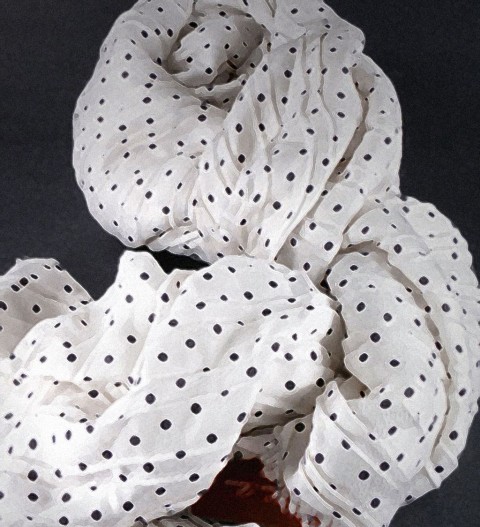Around her head this Monday, she wears a fringed scarf, wrapped and twisted and tied in tight knots like knuckles. It’s arranged so that the fringe hangs precisely across her forehead, reminiscent of the bangs she once had. She arrives early to my classroom, bringing with her much noise, bumping into door, desk, some chairs. This is because she’s balancing a large cardboard box, which is not a homework assignment for any lesson. She wants me to stop whatever I’m doing so she can show me that inside the box she has fashioned her fantasy bedroom complete with yellow polka-dotted wallpaper she made from shelf liner and permanent markers. On some dots she has drawn smiley faces; on others, petals.
“Dots make me happy,” she says, “Sunday-sunflower happy.” If she still had some, her hair would be bouncing along with her chirpy syllables. Instead she juts out her bottom lip and huffs and puffs air from her mouth to make her fringed bangs flutter. This girl of dots has pulled out her real hair. Yanked all of it. Under the scarf her scalp is scraped and fiery raw in some places, bumpy with scabs in others. When new hairs appear, they won’t last long. If her fingers won’t do the job, she resorts to tweezing. She will do whatever it takes to pull them out. I haven’t seen this for myself. My information comes from the school nurse, who’s allowed to divulge only certain pertinent facts.
The dotted girl’s face is pertinent. In the last couple of weeks, she has started to pull out her eyebrows and lashes. She looks at me now, her nearly naked eyes very much like an Orphan Annie cartoon.
“When I grow up, my house will be full of dots,” she says. “This bedroom is only the beginning.” She opens the little door she has cut into the side of the box and stoops so that she can peer into her tiny room. I can see her eye like a giant’s framed by the miniature doorway, but I cannot see her mouth as she speaks.
“When my mother was little, she had a book about a girl named Polka-Dottie who had dots on everything, all colors and sizes. Lots and lots of dots and dots. That’s what the book said. I know because my mother told me. She said Polka-Dottie’s house was dotted. And her clothes were dotted. And her furniture. And her dishes. And every, everything you could ever imagine. Polka-Dottie even had the cutest little dotted dog named Polka-Spottie. Isn’t that funny?” She stops here, stands up, walks to the other side of her bedroom box so she can reach in to adjust the ruffled curtains on the window.
She continues, “And Polka-Dottie’s whole life was as happy as clowns, but then while she and Polka-Spottie took an afternoon nap, a mean old villain named Poison Sumac crept in like a nightmare. And guess what happened? He stole her dots and crammed them into a black satchel. He took all of them, every single dot, and away he ran, laughing his evil laugh.”
At this point, the little dotted girl, wild-eyed at the drama of her own story, tilts her head back as far as she can without dislodging the scarf, and in a low menacing voice, issues forth her version of an evil laugh. She says, “And when Dottie woke up, she saw what had happened and she was so, so heartbroken that she just sat herself down under her clothesline where all her sheets and pillowcases and dresses hung limp and plain and colorless, and she bawled her eyes out until the hero came to rescue her dots and return them to her all safe again and as bouncy as balloons.
“My mother doesn’t exactly remember the hero’s name. It was something very ordinary, not a hero’s name at all, but finally, finally, in the happy ending he does come. And that’s the important part, don’t you think?”
She sighs as she explores her bedroom box, fingering the delicate paper furniture that, probably, she has spent her entire weekend constructing. Every perfect, folded piece is in place, a lovely matching suite, all angled and pleated, creating an intricate origami world. There’s a wardrobe and a vanity with a mirror that obviously came from an old compact. Centered along the main wall sits her four-poster-Popsicle-stick bed on which she has placed a yellow chenille coverlet which, she whispers conspiratorially, “is really a square I cut from the hem of my mother’s summer bedspread. It has fringe and everything. I trimmed it so it barely touches the floor. Don’t you just love it?”
I ask her what will happen when her mother discovers a piece missing from her bedspread. She shrugs and says, “She’ll never ever notice, at least, until summer anyway, and now it’s only fall. There’s plenty of time for her not to notice. And plus, yellow is my favorite, favorite color, not my mother’s anyway.”
The dotted girl doesn’t tell me what else she has cut apart and pilfered in order to dress the little windows in filmy gauze the color of pollen. On the wall above her bed, hangs a toothpick frame. The tiny copied painting it holds is unmistakable.
“That’s my Van Gogh. It’s his sunflowers,” she says, taking on an exaggerated British accent. “I paid billions of dollars for it. Van Gogh cut off his own ear. He made another painting of his own face that shows the actual bandage. Did you know that?” She turns her head, her fringe fluttering to one side.
“That one will be my finishing piece. It’s not painted yet but when it is, I’ll hang it between the windows on this big empty wall right here.” She points to the exact spot. “And guess what? Then Van Gogh’s eyes will be looking right at his very own sunflowers. Maybe seeing them will cheer him up so he’ll be as happy as Polka Dottie.”
She clucks her tongue. “This painting just won’t stay straight.” She leans into her box and with the tip of her finger, she rights the crooked frame. “There,” she says. “That’s better. That’s perfect. I hate, hate when everything goes all slanted.”



